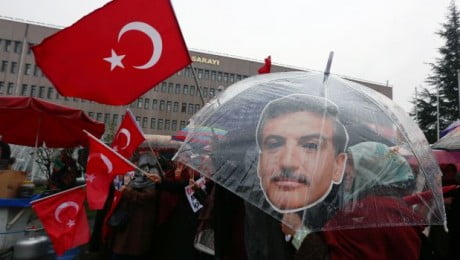Keyword: Freedoms

Dozens of US Congress members urge Kerry to press Turkey for freer media
A large number of members of the US Congress have voiced concerns on the recent arrest of media members in Turkey and called on Secretary of State John Kerry to press the Turkish government to secure press freedom in the country.

Fethullah Gülen on Islam, democracy and freedom of speech
Publishing a book in 2009 about Francis of Assisi’s peaceful encounter with Egypt’s Sultan Malik al-Kamil during the Fifth Crusade led me to meet a lot of people with an interest in improving interreligious relations. Among them were a number of Turkish immigrants who are followers of the Islamic scholar Fethullah Gülen. I observed that through a network of private schools, foundations and media organizations, they have worked very hard to improve Muslim-Christian relations.

Fethullah Gulen: Turkey’s Eroding Democracy (op-ed in NY Times)
It is deeply disappointing to see what has become of Turkey in the last few years. Not long ago, it was the envy of Muslim-majority countries: a viable candidate for the European Union on its path to becoming a functioning democracy that upholds universal human rights, gender equality, the rule of law and the rights of Kurdish and non-Muslim citizens.

GYV’s dialogue center not returned despite court order
Journalists and Writers Foundation (GYV) officials were forced to leave its affiliate Intercultural Dialogue Center (KADIM) office in the Eyüp district of İstanbul despite a court order ruling that GYV could return to the premises after the dialogue center was unlawfully evacuated by municipal police on Dec. 26, 2014.

US voices concern about press freedom over Karaca’s arrest
The United States has expressed concern about press freedom in Turkey in regards to the Samanyolu TV network’s top executive, Hidayet Karaca, being arrested after a media crackdown on Dec. 14, saying that it is continuing to address these concerns to Turkish authorities.

EP condemns media crackdown in name of rule of law, press freedom
The European Parliament on Thursday condemned the Turkish government’s attempt to silence critical media by launching raids on media institutions and detaining journalists on Dec.14, saying the steps taken by the Turkish government against the media raises questions about the rule of law and freedom of the media in the country.

First purification, next habituation
First of all, in terms of historical settings and cultural codes, Turkey has never found the solid ground to have a fully fledged democracy. The political elites have paid lip service to democracy and viewed democracy as an “electoral democracy.” As we see today, once the political elites have come to power they have adhered to authoritarian practices and curbed freedom and rule of law with the aim to serve their own interests.

Turkey’s war on the press
Erdogan’s reckless behavior is hurting not only his legacy but also Turkey and its allies. Turkey’s image as a stable investment hub has been damaged. A politics of character assassination, polarization and suppression inevitably creates dangerous social stresses. An internally chaotic Turkey cannot be considered a reliable partner for the international community.

Erdoğan’s abstract enemies: parallel organization and superior mind
Totalitarian regimes rely on their ability to manufacture enemies. In his New Year message, President Recep Tayyip Erdoğan referred to a host of “external enemies” and “traitors.” The ruling party characterizes these traitors as the “parallel organization” and “superior mind.” The phrases “parallel state” and “Pennsylvania organization” are used synonymously with the “parallel organization” as well.

Ekrem Dumanli: Turkey’s witch hunt against the media
Turkey’s leader for almost 12 years, Erdogan contributed to economic successes and democratic reforms during his first and second terms. However, emboldened by consecutive election victories and incompetent opposition parties, he is now leading Turkey toward one-man, one-party rule.






















